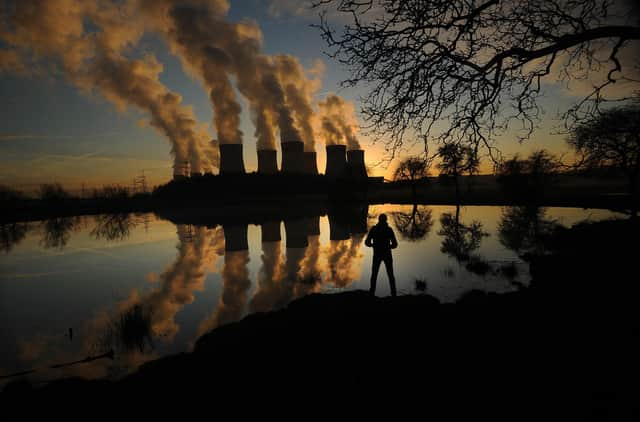Post-virus age must involve new approach to UK’s energy supply: Tony Lodge


The last few weeks have created a perfect storm for energy planners where too much supply against low demand has risked overloading the grid and causing blackouts. The underlying message here is the need to better manage and balance weather dependent renewable power which is growing and has been the largest source of electricity in recent weeks.
First some key statistics. The last time UK electricity supplies saw demand so low was in 1975 and the US has not seen such a slump since 2004 as industry, businesses and transport networks have stopped.
Advertisement
Hide AdAdvertisement
Hide AdWhilst electricity demand in April was down by 15 per cent the sunny and windy days saw renewables setting records supplying up to 60 per cent of daytime electricity.
But reduced demand alongside increased wind and solar supplies presents a serious balancing challenge as well as an opportunity to re-think future strategy.
With more of us now at home, we are seeing the return of the pick-up effect, which has lessened in recent years because of on-demand TV.
The grid therefore needs to improve and maintain high flexibility in order to be able to ramp up other sources of reliable generation quickly when the pattern of supply shifts, such as when the sun sets or the wind stops. This is best done with gas fired power plants which can react quickly to cover erratic renewable supplies and more will be needed. Another key development will be the ability to store spare renewable power so that it is no longer discarded and wasted when it can’t be used in real time.
Advertisement
Hide AdAdvertisement
Hide AdThe pandemic has reminded us how dependent we are on electricity. It has meant a near virtual existence as we work from home and try to keep entertained. Whether it be video-live streaming for work, online shopping, virtual learning for kids stuck at home or the critical power demands of the NHS, the supply of electricity has shown why it is the backbone of modern civilization.
Any interruption or break in supply for our digital society would be catastrophic.
The challenge of supplying and balancing electricity supplies in these changed circumstances is now paramount as traditional peaks in demand flatten out and more and more power supply is dependent on the weather, particularly wind and solar. Consequently, a renewed focus after lockdown on energy security will be crucial as it is key to our future prosperity, growth, ambitious carbon targets and economic stability. Usefully there will be a new energy White Paper later this year when the Government can spell out its plan. The task here is the need to build a more flexible, reliable, clean and secure electricity supply industry going forward.
Where Britain sources its wider energy supplies must also now receive closer scrutiny. We are increasingly importing energy supplies which carry a large production and transportation carbon footprint.
Advertisement
Hide AdAdvertisement
Hide AdFor example, the UK looks set to be locked into large and growing gas imports going forward, such as long distance shipments of liquefied natural gas, so long as we neglect our own gas resources. Irrespective of the pollution, the sources of those gas supplies might raise eyebrows. It is forecast that the UK will increasingly depend on Qatar for growing amounts of gas. This is a state which is effectively being blockaded by its Gulf neighbours following repeated accusations of funding terrorism and extremist causes.
As well as importing wood chip from the USA to burn at Drax, which carries a huge carbon shipping footprint, why are we importing coal generated electricity from Europe via undersea cables when ministers say they want coal power in Britain stopped?
This is known as “offshoring” and Britain needs to stop hiding its emissions abroad. A new carbon border tax could be the answer.
The fallout from COVID-19 allows for an energy policy re-set in the national interest to deliver more flexibility, decarbonisation and security of supply. We must not waste this important and timely opportunity.
Advertisement
Hide AdAdvertisement
Hide AdTony Lodge is the author of The Great Carbon Swindle – How the UK hides its emissions abroad, published by the Centre for Policy Studies
Editor’s note: first and foremost - and rarely have I written down these words with more sincerity - I hope this finds you well.
Almost certainly you are here because you value the quality and the integrity of the journalism produced by The Yorkshire Post’s journalists - almost all of which live alongside you in Yorkshire, spending the wages they earn with Yorkshire businesses - who last year took this title to the industry watchdog’s Most Trusted Newspaper in Britain accolade.
And that is why I must make an urgent request of you: as advertising revenue declines, your support becomes evermore crucial to the maintenance of the journalistic standards expected of The Yorkshire Post. If you can, safely, please buy a paper or take up a subscription. We want to continue to make you proud of Yorkshire’s National Newspaper but we are going to need your help.
Advertisement
Hide AdAdvertisement
Hide AdPostal subscription copies can be ordered by calling 0330 4030066 or by emailing [email protected]. Vouchers, to be exchanged at retail sales outlets - our newsagents need you, too - can be subscribed to by contacting subscriptions on 0330 1235950 or by visiting www.localsubsplus.co.uk where you should select The Yorkshire Post from the list of titles available.
If you want to help right now, download our tablet app from the App / Play Stores. Every contribution you make helps to provide this county with the best regional journalism in the country.
Sincerely. Thank you.
James Mitchinson
Editor
Comment Guidelines
National World encourages reader discussion on our stories. User feedback, insights and back-and-forth exchanges add a rich layer of context to reporting. Please review our Community Guidelines before commenting.